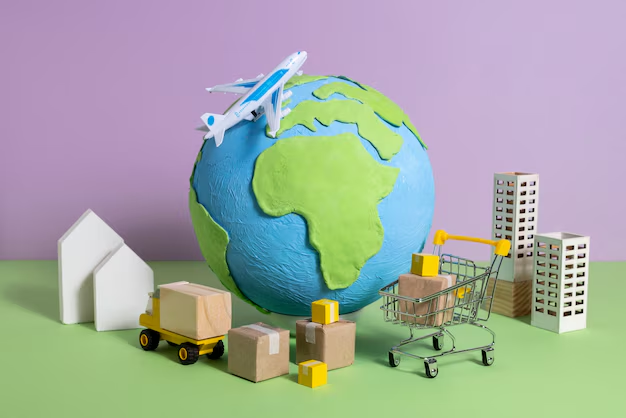Introduction
Emerging markets are a group of countries that are rapidly developing their economies and infrastructure. These markets include countries like Brazil, India, China, and South Africa. These are nations with high economic potential but still face developmental challenges.
Their role in global business is growing day by day due to low labor costs, a vast consumer base, and rapid urbanization, which are major attractions for international companies. Economic experts predict that emerging markets will drastically change the global economic landscape in the coming decades.
Foreign Investment Opportunities

Emerging markets are like a goldmine for foreign investors. Companies can expand their operations in these countries and earn massive profits. These markets provide new growth opportunities where market saturation is less of an issue.
Low production costs and favorable government policies also boost investment in these countries. They encourage foreign direct investment (FDI), which not only boosts local economies but also gives international businesses the chance to reach new audiences with their products and services.
Technological Advancements and Emerging Markets
The rapid development of technology and digital infrastructure is a key driver for emerging markets. Due to the increased internet and mobile penetration, e-commerce and digital businesses are gaining momentum in these countries.
Today, nations like Brazil and India are rapidly adopting digital transformation. Tech startups are booming here, bringing innovations and business solutions. Global companies are leveraging these emerging tech hubs by integrating their products and services into these digital ecosystems.
Consumer Behavior in Emerging Markets
Consumer behavior in emerging markets is quite different. These markets showcase rapidly changing consumer preferences and behaviors, presenting both new challenges and opportunities for companies.
For instance, in Indian and Chinese markets, the middle class is rapidly growing, and they are seeking new products and brands. Multinational corporations need to understand that each market has its unique demand pattern, and they must localize their product offerings and marketing strategies to succeed.
Role of Emerging Markets in the Global Supply Chain

Emerging markets play an increasingly important role in the global supply chain. China has become the world’s largest manufacturer and exporter, while Brazil is a leader in the agriculture sector. Emerging markets provide raw materials, low-cost labor, and manufacturing hubs that keep global businesses running smoothly.
However, companies must also focus on risk management due to the frequent political instability and regulatory issues in these markets. Flexibility and adaptability are essential for businesses investing in these regions.
Regulatory Challenges in Emerging Markets
The regulatory frameworks in emerging markets are often underdeveloped, posing a significant hurdle for foreign businesses. Each market has its legal and regulatory environment, which creates complex challenges for cross-border businesses.
Companies must thoroughly analyze these environments through their legal teams and local consultants to maintain compliance and ethical standards. For example, China’s strict data privacy laws present challenges for foreign tech companies.
Emerging Markets and Local Partnerships
For global businesses, forming local partnerships and collaborations in emerging markets is crucial. Partnering with local businesses and governments enables companies to conduct their operations smoothly while also gaining the trust of the local consumer base.
These partnerships provide companies with local knowledge and resources, which are invaluable for market entry and expansion strategies. Working with local distributors and vendors, and leveraging their expertise, gives global companies a competitive edge.
Socio-Economic Challenges

Emerging markets also face significant socio-economic challenges that can create barriers for global businesses. Issues like poverty, inequality, and lack of basic infrastructure can slow down company operations.
However, these challenges also offer businesses the opportunity to focus on their corporate social responsibility (CSR) initiatives. Companies that address local community issues can gain long-term local support and loyalty, which is essential for their success.
Sustainability and Emerging Markets
Sustainability has become a key focus for global businesses, and its role in emerging markets is crucial. These countries often suffer from overexploitation of natural resources, leading to environmental degradation.
Global businesses operating in these markets must adopt environmentally friendly practices. This not only gives their products a sustainable image but also earns the support of local governments and consumers. Sustainability initiatives, such as renewable energy projects and waste reduction strategies, are in high demand in emerging markets.
Future Prospects: The Bright Future of Emerging Markets
In the coming decades, the role of emerging markets in global business is set to grow even further. According to economic experts, by 2030, the majority of global economic growth will come from these markets. Low-cost production, a young workforce, and a growing middle class will make these countries the engines of the future global economy.
However, managing political risks and market volatility will be crucial for companies. Businesses that establish a foothold in these markets through long-term investments and innovative solutions are likely to become major players in the future.
Conclusion
Emerging markets have drastically changed the landscape of global business. These countries offer numerous new opportunities for companies, but to succeed, businesses must keep their strategies flexible and adaptable. The next phase of global economic growth will be based in these emerging economies, and the companies that understand these changes and adapt their operations accordingly will become the global leaders of tomorrow.
Last Update: September 13, 2024




